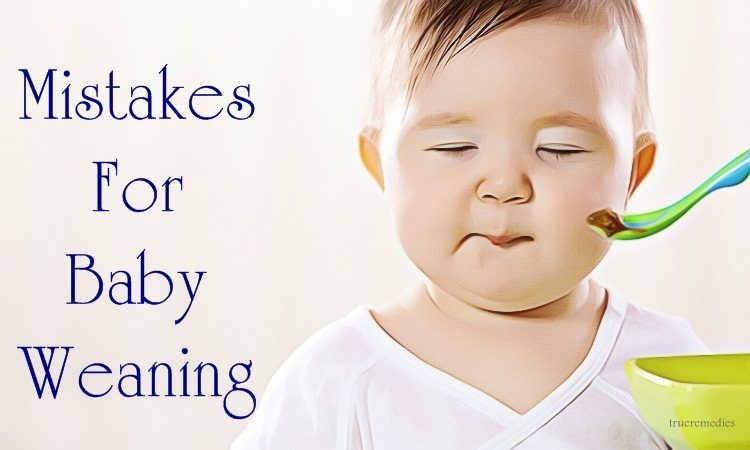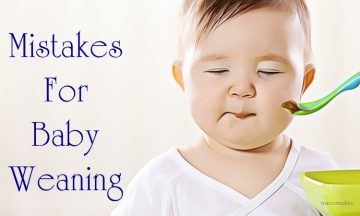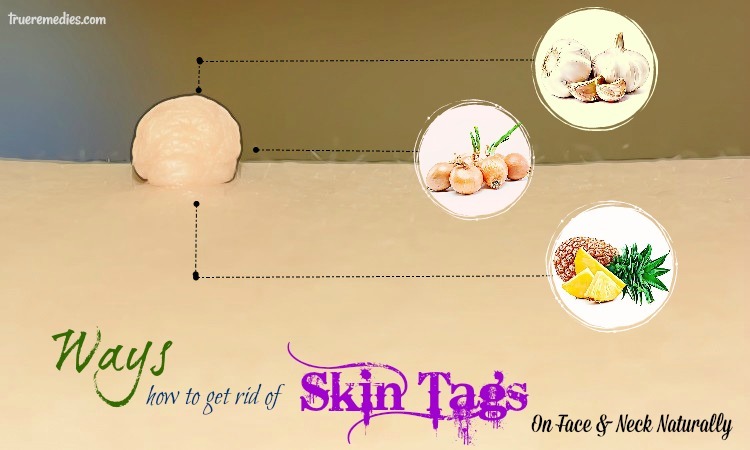Contents
When the right time comes, stopping breastfeeding and giving your baby real food is an important step you have to go through in parenting. However, sometimes, this process could be challenging enough to cause headaches in parents and weaning can lead to fussiness. Talking about baby weaning, different people have different ideas and opinions. Yes, baby weaning is complicated and vital for a baby’s development and growth. Unfortunately, many parents often make these following mistakes without knowing that they can result in dangers and life-threatening risks. Therefore, our TrueRemedies will unveil the common mistakes for baby weaning to help moms avoid.
- Top 6 Worth-Trying Tips To Raise Boys To Be Gentlemen
- Top 21 Unsafe Foods babies Can’t Eat In The First Year (This article was medically reviewed/fact checked by Dr. Annie Markowitz)
- Is It Safe For Newborns To Drink Water?
Top 10 Common Mistakes For Baby Weaning And Its Dangers
I. Why Is Weaning Important?
Premature babies always need a specific diet plan to ensure they get optimal nutrients for maximum development. Newborns and infants should be fed breast milk because it is a great source of ideal nutrients such as protein, vitamins and fat – everything needed for a baby’s health and growth[1].
However, at a stage, breast milk or formula milk isn’t sufficient for babies who have increased nutritional needs. Also, at this stage, the iron babies got in the womb will decrease significantly[2]. Therefore, parents need to change the baby’s diet and add solid foods rich in iron to their daily meals.
Furthermore, offering a wide range of new textures and tastes to baby’s diet can help them to have a balanced diet later in life. That also prevents your baby from becoming a fussy eater.
Eating solid foods can help your babies to practice tongue, lip and jaw movements. That is useful because, during the weaning period, they will learn how to master skills like swallowing and chewing. It also supports in a long way to establish a baby’s speech.
Weaning is also the time when your family eat together. By watching their mom and dad eat, babies will learn eating skills and enhance social relationships.
TrueRemedies Partner Solutions

Need a Help from the Leading Expert Online, Available 24/7?
They’re all here and ready to answer your questions online or by phone. Keep asking questions until you get the answer you need.
Moreover, weaning is an excellent opportunity for your family to be involved in feeding the baby.
II. Common Mistakes For Baby Weaning And Its Dangers
Most parents know that giving solids to babies is an essential step for making your child familiar with food preferences and building a healthy future eating habits. However, there are some unintended mistakes parents often make. Fortunately, these mistakes can be prevented.
1. Starting Baby Weaning Too Soon
As stated by the Centers for Disease Control and Prevention, about 40 percent of parents start the baby weaning before four months. However, a 4-month-old child or younger do not have the fully developed digestive and immune system to process food properly and fight against the potential allergen.
Dangers: Giving your babies solid foods too soon can increase the risk of food allergy and many health problems later[3].
2. Wait Too Long To Start Baby Weaning
Some parents worry that their babies can choke or experience an allergic reaction to food; therefore, they delay the baby weaning for a while. Based on their growth and development, babies can eat chopped and table foods at the age of 8 months old. The solid foods can be introduced to a baby at around six months. Delaying baby weaning or waiting too long to start is not good at all, and it can lead to several dangerous problems for your child.
Dangers: Children who didn’t start to eat solids by nine months of age tend to have feeding problems in the future than ones who experienced the weaning between six and nine months of age[4]. Furthermore, they can cause iron deficiency, lead to food texture sensitivity, increase the risk of food allergy development[5] and result in food texture sensitivities.
3. Feed Baby Bland Food
Many parents believe that bland food is good for the baby’s digestive system because babies do not need to chew. It is right only for the beginning stages of introducing solid foods to babies. However, if you keep this diet for more extended periods, it can lead to the problem. Therefore, feeding baby bland food is one of the common mistakes for baby weaning to avoid.
Dangers: Exposing your baby to a particular flavour without changes will make your child become picky eater in the future.
4. Forget Essential Nutrients
Giving a variety of flavours early to baby’s diet will help our child to be able to consume different foods later. However, the nutritional need is also vital for the baby’s health and growth. Therefore, parents need to understand which essential nutrients for different development stages.
For example, during the first two years of life, your baby has to consume foods rich in zinc, iron, total fat, vitamin D, and omega fatty acids. Unfortunately, not all parents can understand this thing.
Dangers: Skipping any essential nutrients like iron or fat can affect the baby’s development and growth.
5. Force Your Baby To Eat More
Although babies can not talk, they will show their fullness and satisfaction by refusing to eat, shaking their heads or becoming disinterested in eating. However, some people ignore their baby’s signs and want to make them eat more or finish the meal. As a result, they encourage children to eat more in spite of the fullness.
Dangers: This mistake can affect the baby’s natural ability to control their eating habits. It also leads to overeating in a child.
6. Allow Your Kids To Consume Sweets Too Often
Little sweets in baby’s diet are harmless, but it can cause an impact on your baby’s eating habits, future food preferences and health. Furthermore, sugar is very harmful to your baby. According to the American Heart Association, sugar should be avoided entirely during the first two years of baby’s life[6]. So are the sugar-sweetened drinks.
Dangers: Babies have limited tummy space. Therefore, when babies overeat sweets, they can not eat other solids rich in nutrients. Moreover, consuming sweets increases the risk of problematic weight gain later.
7. Clean Periodically To Avoid Mess
Feeding your baby with solids food could lead to a total mess. So, some parents who do not like a mess often wipe their baby’s face after a couple of bites, spoon-feed and clean his tray too often. However, that is one of the common mistakes for baby weaning because feeding is the time your child learns the surrounded things by interacting, tasting, smelling, touching and playing with food.
8. Use Medication To Suppress Lactation
Some moms take medications without consulting doctors. However, it should be avoided because the drug bromocriptine (Parlodel) or oestrogen has many possible side effects for breastfeeding moms and their babies. Therefore, it is recommended to let milk production diminish and stop natural.
Dangers: Unintentional use of these drugs without doctor consultant can make milk glands clogged and cause inflammation, swelling or chest abscess. Furthermore, bromocriptine and oestrogens can increase the risk of cerebral accident, thromboembolism, and myocardial infarction[7].
9. Stop Breastfeeding Your Baby Suddenly
Many mothers put a stop in breastfeeding, but it is a weaning mistake that should be avoided because of several issues and side effects.
Dangers: Without psychological preparation for baby weaning, your child can feel depressed and scared. Because of shock after sudden weaning, your baby can suffer from anorexia.
10. Apply Something To The Nipple
Many mothers think that if the baby tastes something bitter on the mom’s nipple, he or she will stop breastfeeding immediately. However, sometimes, this method for baby weaning is not practical but only counter-productive.
Dangers: Applying something to your nipple to stop breastfeeding is like severe torture for a baby. Moreover, this mistake can affect a baby’s oral mucosa.
III. Signs When Babies Are Ready To Wean And Go For Solids
Baby should go through the weaning process when they are six months of age. However, the right time will depend on each individual. Therefore, the doctor may advise you to look at the signs to determine whether your baby is ready for solids.
The sign can be that your baby can sit with support, put anything in his mouth and show his or her interest when you are eating. Moreover, if you see your baby wanting to eat earlier than usual although he or she has been fed large milk, it is time for baby weaning.
IV. Some Tips For Baby Weaning
When it comes to baby weaning, there are some useful tips and techniques you should know.
- Do not start the baby weaning until they are more than six months of age.
- Let baby wean in the spring and autumn, not in the summer or winter. During the summer, the hot weather can cause digestive disorders, discomfort and poor appetite. On the other hand, in the winter, babies are vulnerable to respiratory diseases that may cause difficulty in the baby weaning.
- Only start weaning when your baby is healthy. When your baby is sick, he or she will need to consume more nutrients to recover.
- Start baby weaning gradually. The safest way is to reduce the time spent at the breast and replace breast milk with the solids.
- If your baby wants to be fed milk, you can offer him, or her water, a snack, a favourite toy or you go to a different place.
- During the first few weeks of baby weaning, give your child just one food at a time to make him or her get used to new textures and flavours. After that, you can introduce two or more foods after a few weeks after your child can eat on its own.
- Give your babies very small portions of food when you start the baby weaning. A couple of teaspoons is enough to make the baby’s digestive system get used to digesting solids. That helps the baby’s body produce more digestive enzymes and change their gut bacteria. That is useful when you want to give your baby more food and less milk.
- Eat together, and your baby will learn how to eat from the family.
V. Most Common Questions After Weaning
a. How Can I Introduce Solid Foods To My Baby?
First, make sure your baby sit comfortably in a reclining chair or a high chair designed with back support. Offer him or her a small teaspoon of smashed food mixed with milk. Start with one solid meal a day. When your baby gets used to new textures and tastes and also learns how to swallow food in their mouth competently, you can increase food consistency and quantity.
b. What Kinds Of Food Can I Feed My Baby?
You can begin with baby cereal, pureed fruits or vegetables. When your child can eat these foods, offer him or her a more varied diet. The savoury tastes need to be introduced several times to make babies like it.
c. What Kinds Of Food Should I Avoid?
If your family has a history of food allergies, you need to consult a doctor before giving your baby nuts. Furthermore, the whole nuts are not recommended food for babies until they turn five years old.
Keep your babies from sugar and salt or any foods with these substances. Only give your babies honey when they are one year old.
A 9-month-old baby knows how to eat raw foods like apple pieces or raw carrot sticks, but there is still a risk of choking. Therefore, pay attention to what babies are eating and cut these foods in half. Remove bones from meat and fish and peel the skin from sausages and fruits before feeding your baby.
d. Do I Have To Reduce Milk Feeding When Starting Weaning?
When your baby can eat more food (eat solids three times daily), you can reduce their milk feeding. After introducing two meals of solid food to your baby, you will find them not interested in milk any more. However, a baby needs to consume at least 500 – 600 ml of his usual milk daily before 12 months of age[8]. Therefore, you should keep milk feeding on demand.
Weaning is an essential step during childhood. However, do not feel stressed or anxious. Keep your mood calm and happy. You are doing the best things for your child. We hope that this article can give you useful information and help you avoid the common mistakes for baby weaning most parents make and its dangers. Any queries can be left in the comments box below, and we will answer them as soon as we can.









